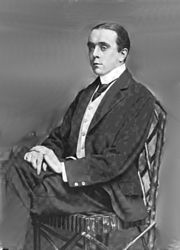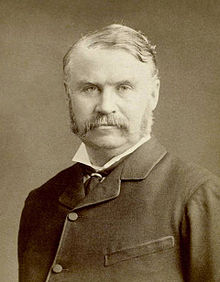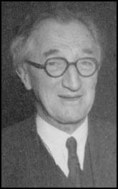We take a break from today’s debates to look at the response to motorisation and its attendant danger from some commentators at the time. Britain tends not have a group of people described as “intellectuals”: however celebrated and articulate people who would pass as such in any other European country existed and gave their views on road danger. Some of this work comes out in ordinary journalism – see the reports on Carlton Reid’s web site such as this others elsewhere. Here I give extracts from AP Herbert , Max Beerbohm and W.S. Gilbert (the Gilbert of Gilbert and Sullivan).
Max Beerbohm; W.S. Gilbert and A. P. Herbert
All were considerable – that word again – intellectuals and had commitments towards addressing social problems. Herbert was an MP and campaigner for causes such as Albanian independence, but above all for law reform. Gilbert was a magistrate. Beerbohm’s satires were gentle attempts to correct the excesses of contemporary life. None of their work can be seen as extreme radicalism: indeed their satire in other areas of life can often be seen as affectionate, and all were knighted. In that sense, the critique of elements of motorisation was capable of appealing to the thinking middle ground of British society.
One point which emerges for me is that while these people were delivering views based on a serious and carefully thought through analysis of motoring and road danger, their views were often expressed with a degree of humour, irony or sarcasm. This was partly because their work involved a degree of lampooning and humour – Beerbohm was described as a parodist, Herbert as a humourist and Gilbert’s work involved lampooning of establishment figures. But maybe it was also because of their isolation from any kind of political movement with which they could ally themselves.
W.S. Gilbert became a Justice of the Peace in Harrow had a reputation for toughness with errant motorists who came up before him.
He wrote this to The Times on 3 June 1903:
Sir,–I am delighted with the suggestion made by your spirited correspondent Sir Ralph Payne-Gallwey that all pedestrians shall be legally empowered to discharge shotguns (the size of the shot to be humanely restricted to No. 8 or No. 9) at all motorists who may appear to them to be driving to the common danger. Not only would this provide a speedy and effective punishment for the erring motorist, but it would also supply the dwellers on popular highroads with a comfortable increase of income. “Motor shooting for a single gun” would appeal strongly to the sporting instincts of the true Briton, and would provide ample compensation to the proprietors of eligible road-side properties for the intolerable annoyance caused by the enemies of mankind.
The only difficulty that occurs to me is as to who shall undertake the rather delicate job of stopping the motor (tearing along at perhaps 35 or 40 miles an hour) after the motorist has been killed or disabled. But, without doubt, Sir R. Payne-Gallwey has considered this point, and will supply a practical suggestion as to how it is to be dealt with.
Your obedient servant,
Harrow Weald, June 2.
W.S. GILBERT
___________________________________________________________________________________________________
A. P. Herbert here satirises (with the reference to telling a grandmother to suck eggs being the key) the London Passenger Transport Board with its invocation to pedestrians to avoid making unnecessary journeys. (This was based on the wartime campaign to reduce journeys by motor vehicle in order to save petrol with the slogan “Is Your Journey Really Necessary” – a slogan which some environmentalists have considered revisiting).
Crossing The Road
by A. P. Herbert
(With mild apologies to the L.P.T.B.)
O silly Brown, O silly Brown,
Be careful, do, in London Town.
Do not attempt to cross the square
If motor-cars are moving there.
For vehicles, at any speed,
May hurt you very much indeed;
And, I’m afraid, the chances are
You will not hurt the motor-car.
Think, too, before you leave this side:
‘Is such a journey justified?
Would it relieve the nation’s load
If I were now to cross the road?
Does it much matter where I am?
Does anybody care a damn?’
An act that does not aid the war
Is wasted effort. What is more,
Who knows if you may not delay
A Civil Servant on his way,
Or make some Minister of State
A priceless half a second late?
Besides, its generally best
For people to remain at rest.
All motion must be friction too
And wears away the strongest shoe.
Shoe-leather is extremely rare,
And so is stuff to pave the Square.
In short, ignore the itch to roam;
Stay where you are, or stay at home.
And if in some remote retreat
Your Grandmama you chance to meet
Absorbing raw old-fashioned food
By methods primitive and crude,
Do not, however hard she begs,
Instruct her how to suck her eggs;
For she, in my considered view,
Can suck her eggs as well as you.
Written September 13, 1942 this verse first appeared in the Sunday Graphic, This version taken from A. P. Herbert’s book “Less Nonsense” published by Methuen & Co in 1944. Page 6-7
In Misleading Cases, a regular column he wrote for Punch on the idiocies of the legal system, he imagined the case of a pedestrian knocked over by a car and accused of being the culprit for having been in the way.
The pedestrian’s contention was that the motor car should be regarded in law as a wild beast — not least because of ‘the boast of its makers that it contains the concentrated power of 45 horses’.
The pedestrian had to be the innocent party, he argued, ‘because if a man were to gallop 45 horses tethered together at their full speed past a cross-roads, no lack of agility, judgement or presence of mind in the pedestrian would be counted such negligence as to excuse his injury. ‘The fact that the 45 horses are enclosed in a steel case and can approach without sound or warning, does not diminish, but augment, their power to do injury.’
________________________________________________________________________________________________
The extract below is from Max Beerbohm’s “Speed”, broadcast in 1936, then printed in the Listener and reprinted in “Mainly on the Air” published by Heinemann in 1946. Parts of this article were reprinted in a pamphlet by the Pedestrians Association.
I find the comments on third party insurance a classic case of how reason contradicts the received views of the “road safety” lobby.
(if you can’t read this scan – click on image – it will be here in normal font shortly)





A P Herbert’s most telling contribution was his poem of about 100 lines, “Without Due Care”, which begins “Old Mrs Alice Bird is dead/Crossing the road without due care/The driver said she lost her head . . . “
Thanks for this Derek, I wasn’t aware of it.